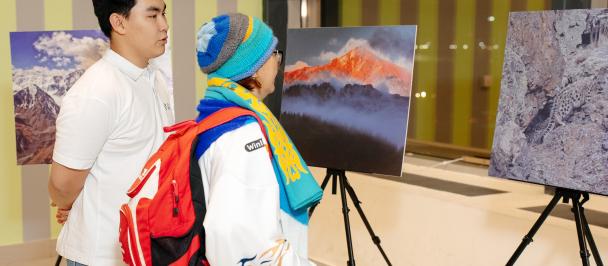Welcoming Remarks by UNDP Deputy Resident Representative Vitalie Vremis
June 2, 2022
Dear Ms. Ramazanova,
Dear honorable members of TurkPA Women Parliamentarian Group,
Distinguished speakers and guests,
It is a great honor to join today’s important discussion on enhancing women’s participation in decision-making as a vital component of Climate Action and sustainable development for all.
Today climate change represents the most complex challenge of our time. The impacts of climate change, including on access to productive and natural resources, have exacerbated already existing gender inequities.
Climate change affects women's and men's assets and well-being in a different way in agriculture, industry, food security, health, water and energy resources, climate-induced migration and conflicts and in climate-related natural disasters.
As United Nations Development Programme, we are working with national counterparts to build a greater understanding on the gender and climate nexus and to strengthen capacities across the governance, planning, and policy areas to better facilitate gender-responsive action.
Women’s leadership at the community and at political levels is necessary for ambitious NDC implementation measures. For example, under the Climate Promise, 115 countries (of a total of 118) are planning to integrate gender into their NDCs.
The bold, transformational changes are needed to meet more ambitious climate targets, tackling structural inequalities, especially those between women and men, that perpetuate the negative impacts of climate change.
The growing acknowledgement of the disproportionate impacts of climate change on women in recent years has gone hand-in-hand with a growing awareness of their role as agents of change. It also brought the understanding of the immense value of gender equality and women's empowerment outcomes in realizing the social, economic and climate benefits of sustainable development.
To implement this agenda, we need women at the decision-making table. Over the last 26 years, since the adoption of the Beijing Declaration and Platform for Action by the United Nations in 1995, the number of women parliamentarians increased two-fold.
Women's participation in parliament in Kazakhstan has also improved over the decades of independence. International community positively welcomed Kazakhstan’s commitment in 2020 to set up a 30% electoral gender quota for parliamentary elections.
In the meantime, to reach gender parity in parliament by 2030 in Kazakhstan, we need to strengthen our concerted efforts and tap into bolder initiatives. Only with the right approach, quotas can accelerate progress towards gender parity in parliaments by 2030.
Building effective, inclusive, and accountable governance is critical for countries wanting transformational change. The engagement of legislators is a key in this regard. I believe that TurkPA’s Women Parliamentarians Group is crucial to exchange experiences on how countries are addressing gender inequality and taking action for the sustainable development for all.
Enabling women to be more involved in the decision-making processes in their countries, and building their skills and knowledge to contest for elected positions is always a long-term investment for the betterment of the whole society.
In the era of New Kazakhstan, we need more women leaders than ever today. Our girls and boys need to witness women role models on a daily basis, among others, and to actively pursue such careers if they wish to.
I am convinced that given the high-level representation in this panel, we will be able to identify main priorities for further development to achieve gender equality and come up with practical recommendations for a more equal world.
Thank you. Kop raqmet.

 Locations
Locations


